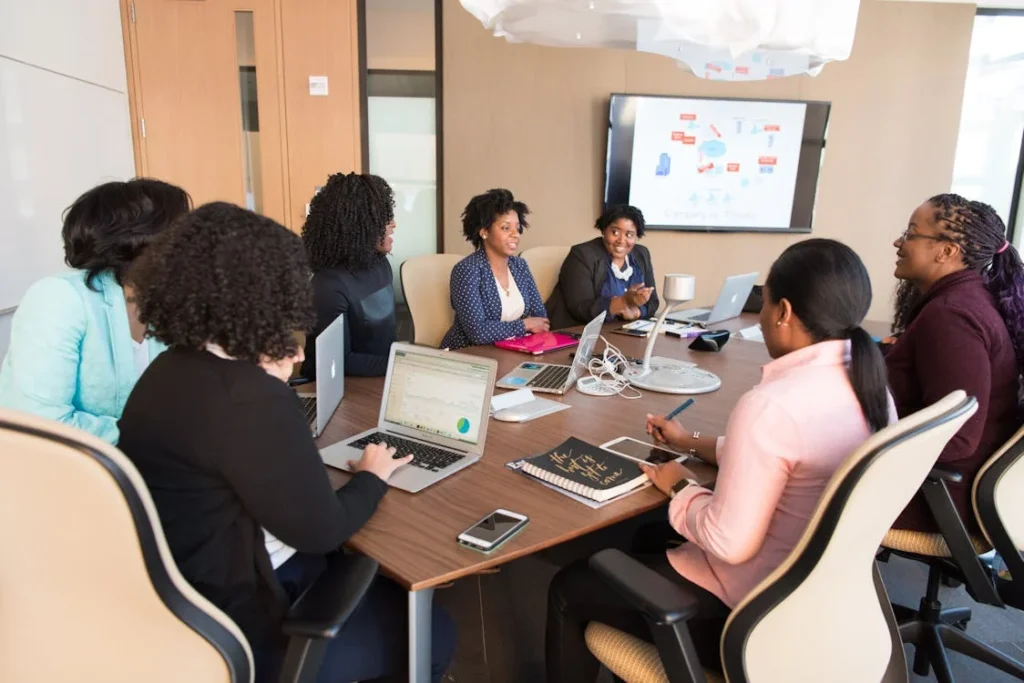Hiring people with disabilities is not just about doing the right thing—it makes strong business sense. In India, where millions of talented individuals with disabilities remain unemployed due to societal biases and infrastructural challenges, businesses have a unique opportunity to tap into an underutilized workforce. Companies that embrace disability inclusion benefit from increased innovation, improved company culture, and access to government incentives.
Beyond social responsibility, businesses that prioritize inclusivity see measurable gains in productivity, brand reputation, and customer loyalty. As companies compete for skilled talent, hiring people with disabilities can provide a competitive edge while fostering a workplace that values diversity and resilience.

The Business Benefits of Hiring People with Disabilities
Access to a Skilled and Loyal Workforce
Many businesses overlook the vast pool of skilled individuals with disabilities in India, assuming that their capabilities are limited.
In reality, people with disabilities bring unique perspectives, problem-solving abilities, and determination that make them valuable assets to any organization.
Many have degrees in engineering, finance, IT, and other professional fields but struggle to find employment due to societal biases and inaccessible workplaces.
Companies that hire people with disabilities often experience higher employee retention rates.
Studies show that employees with disabilities tend to be more loyal to their employers, reducing the costs associated with high turnover and frequent hiring. Their commitment to their roles fosters stability within teams, leading to a more engaged and productive workforce.
Enhanced Innovation and Problem-Solving
Diversity in the workplace drives innovation, and employees with disabilities contribute fresh perspectives that enhance problem-solving and creativity.
Many individuals with disabilities have spent their lives adapting to challenges, developing resilience, and finding unique solutions to everyday problems.
These skills translate directly into the workplace, where their ability to think outside the box can lead to improved products, services, and customer experiences.
Technology companies, for example, have found great value in hiring employees with disabilities to improve accessibility features in their software and hardware.
Their lived experience provides insights that others may overlook, resulting in products that are more user-friendly and inclusive.
This level of innovation is not limited to tech companies—businesses in all sectors can benefit from employees who bring new perspectives to traditional ways of working.
Strengthened Brand Reputation and Customer Loyalty
Companies that prioritize disability inclusion gain a stronger brand reputation, both among customers and within the industry. In today’s market, consumers are increasingly drawn to businesses that demonstrate social responsibility.
When a company actively hires and supports people with disabilities, it sends a powerful message about its values, making customers more likely to trust and support the brand.
Additionally, people with disabilities and their families represent a significant consumer base.
By employing individuals with disabilities, businesses naturally become more attuned to the needs of this demographic, leading to products and services that cater to a wider audience. This inclusive approach not only drives sales but also builds lasting customer relationships.
Access to Government Incentives and Compliance Benefits
In India, the government has implemented various initiatives to encourage businesses to hire people with disabilities.
Companies that embrace disability inclusion may qualify for tax benefits, financial incentives, and grants under programs such as the Rights of Persons with Disabilities Act, 2016.
Additionally, businesses with a strong diversity and inclusion policy may find it easier to secure contracts with multinational corporations and government agencies, many of which require suppliers to meet certain diversity standards.
Hiring people with disabilities also helps businesses stay ahead of legal and regulatory requirements. Companies that proactively build inclusive workplaces avoid potential compliance issues while demonstrating their commitment to equal opportunity employment.
This proactive approach not only safeguards the company’s reputation but also positions it as a leader in corporate responsibility.

How to Build an Inclusive Workplace for Employees with Disabilities
Creating an Accessible Work Environment
For businesses to successfully hire and retain employees with disabilities, they must ensure that the workplace is physically and digitally accessible.
Many workplaces in India still lack basic accessibility features such as ramps, elevators, and accessible restrooms, making it difficult for employees with mobility impairments to navigate their workspaces.
Investing in infrastructure improvements, such as installing ramps and ergonomic workstations, can significantly enhance workplace inclusivity.
Beyond physical accessibility, digital accessibility is equally important. Many job roles require the use of software, websites, and communication tools that may not be fully accessible to individuals with visual, hearing, or motor impairments.
Companies should ensure that their internal systems, HR portals, and work tools comply with accessibility standards. Implementing screen readers, captioning for video calls, and voice recognition software can help create a more inclusive digital environment.
Changing Workplace Attitudes and Breaking Stereotypes
One of the biggest barriers to disability inclusion in India is the deep-rooted misconception that people with disabilities are less capable of performing job roles effectively.
Businesses must actively work to challenge these stereotypes by fostering an open and supportive culture. Training programs on disability awareness can help employees and managers understand the strengths and capabilities of their colleagues with disabilities.
Creating employee resource groups (ERGs) for people with disabilities and their allies can also promote inclusion. These groups provide a safe space for employees to voice their concerns, share experiences, and suggest workplace improvements.
When employees with disabilities see that their contributions are valued, it fosters a sense of belonging and encourages them to perform at their best.
Providing Reasonable Accommodations
Many businesses hesitate to hire people with disabilities because they assume accommodations will be expensive or complicated. However, most workplace accommodations are simple and cost-effective.
Something as basic as flexible work hours, remote work options, or modified workstations can make a significant difference in an employee’s ability to perform their job efficiently.
For example, an employee with a hearing impairment may benefit from sign language interpretation during meetings or access to real-time captioning software.
A visually impaired employee may need screen-reading software to navigate digital tools. These accommodations not only support employees with disabilities but also improve overall workplace efficiency by ensuring that everyone has the tools they need to succeed.
Inclusive Hiring Practices and Recruitment Strategies
Hiring people with disabilities requires a shift in how companies approach recruitment. Traditional hiring processes often unintentionally exclude candidates with disabilities.
For instance, job descriptions may include unnecessary physical requirements, or interviews may not accommodate different communication needs. Businesses should review their hiring practices to remove such barriers and ensure an inclusive recruitment process.
Partnering with disability organizations, vocational training centers, and NGOs that specialize in disability employment can help companies connect with qualified candidates.
Conducting job fairs specifically for individuals with disabilities or working with platforms that cater to disabled job seekers can also be effective strategies.
Companies should also consider alternative assessment methods. Standardized interviews may not always be the best way to evaluate a candidate’s potential, especially if they have a communication-related disability.
Offering skill-based assessments, work trials, or structured internships can provide a more accurate measure of a candidate’s abilities.

Success Stories: Businesses Leading the Way in Disability Inclusion
Indian Companies Embracing Disability Hiring
Several forward-thinking companies in India have already recognized the immense value of hiring people with disabilities.
These organizations have gone beyond compliance and have actively created environments where employees with disabilities can thrive. Their success stories demonstrate that inclusion is not just a moral responsibility but a business advantage.
One such example is Tata Consultancy Services (TCS), which has integrated disability inclusion into its hiring policies.
TCS has created accessible workplaces and developed specialized training programs for employees with disabilities, enabling them to contribute effectively to various IT and software development projects.
The company has also partnered with NGOs to identify and recruit skilled candidates with disabilities, proving that a structured approach to inclusion leads to long-term success.
Similarly, Lemon Tree Hotels has gained international recognition for its inclusive hiring practices. The company actively recruits employees with hearing, speech, and intellectual disabilities for roles in housekeeping, front office, and food service.
By modifying training methods and providing ongoing support, Lemon Tree Hotels has built a workforce where employees with disabilities perform just as efficiently as their peers.
Their commitment to inclusion has also resulted in a strong brand reputation, attracting customers who appreciate their social responsibility efforts.
Another inspiring example is Big Bazaar, which has made a conscious effort to employ people with disabilities across various departments.
By offering accessible workstations and training programs, the retail giant has successfully integrated employees with mobility and hearing impairments into its workforce.
Their approach has demonstrated that when businesses take small but meaningful steps toward inclusion, they can create opportunities that benefit both employees and the company.
Global Brands Setting an Example
International companies operating in India have also set a high standard for disability inclusion. Microsoft India has been a strong advocate for hiring employees with disabilities, offering reasonable accommodations such as assistive technologies and flexible work arrangements.
The company’s focus on accessibility has not only helped employees with disabilities succeed but has also improved the usability of Microsoft’s products for millions of customers worldwide.
Accenture India has taken inclusion a step further by launching mentorship programs for employees with disabilities and ensuring that all their office spaces meet global accessibility standards.
Their inclusive hiring practices have positioned them as a leader in the corporate world, proving that disability inclusion can be seamlessly integrated into business operations.
The Competitive Advantage of Inclusive Companies
The success of these companies highlights a common theme: businesses that invest in disability inclusion experience tangible benefits, including improved employee morale, lower attrition rates, and enhanced innovation.
Customers and investors are increasingly valuing companies that embrace diversity, making disability inclusion not just a corporate social responsibility initiative but a strategic business decision.
For businesses in India that have yet to take steps toward hiring people with disabilities, these examples serve as proof that inclusion leads to success.
Companies that follow the lead of industry pioneers will not only gain a loyal and motivated workforce but also enhance their reputation in the marketplace.

Steps Businesses Can Take to Improve Disability Inclusion
Building a Culture of Inclusion from the Top
For disability inclusion to be truly effective, it must start at the leadership level. When company leaders actively advocate for inclusive hiring, it sets the tone for the entire organization.
Business owners, CEOs, and HR heads should openly communicate their commitment to hiring people with disabilities and integrate inclusivity into their core values.
This can be done by establishing clear policies, setting measurable diversity goals, and making inclusion a key part of the company’s business strategy.
Leaders must also educate themselves about the challenges faced by people with disabilities in the workplace.
Attending disability inclusion workshops, consulting with experts, and engaging directly with employees with disabilities can help create a more informed and proactive leadership team.
When employees see that their company’s leaders genuinely care about inclusion, it encourages an environment of acceptance and equal opportunity.
Partnering with Disability Organizations and NGOs
One of the most effective ways to improve disability hiring is by collaborating with organizations that specialize in training and supporting people with disabilities.
NGOs and vocational training centers across India provide skill development programs tailored to individuals with different disabilities. By partnering with these organizations, businesses can tap into a well-prepared talent pool and receive guidance on inclusive hiring practices.
Organizations such as Enable India, National Centre for Promotion of Employment for Disabled People (NCPEDP), and Youth4Jobs have extensive experience in helping businesses implement disability inclusion initiatives.
These groups assist with recruitment, workplace accommodations, and training programs to ensure a seamless integration of employees with disabilities into the workforce.
Additionally, companies can engage in corporate social responsibility (CSR) initiatives that support disability inclusion.
Sponsoring training programs, providing scholarships for students with disabilities, or funding accessibility improvements in public spaces can further demonstrate a company’s commitment to the cause.
Training Employees and Creating an Inclusive Work Culture
Workplace inclusion does not stop at hiring—it requires continuous efforts to create an environment where employees with disabilities feel respected and valued.
One of the most effective ways to foster inclusion is through company-wide training programs that educate employees on disability awareness, accessibility, and workplace etiquette.
For example, training sessions can cover topics such as how to interact respectfully with colleagues with disabilities, how to use inclusive language, and how to assist in an emergency.
Employees should also be encouraged to ask questions and seek guidance on how to create a supportive work environment.
Another way to reinforce inclusivity is by celebrating important disability awareness events such as the International Day of Persons with Disabilities.
Organizing discussions, guest speaker sessions, or interactive activities can help raise awareness and reinforce the company’s commitment to an inclusive culture.
Implementing Inclusive Workplace Policies
A company’s policies play a crucial role in ensuring long-term disability inclusion. Businesses should review their HR policies to ensure that they accommodate the needs of employees with disabilities.
This includes offering flexible work arrangements, allowing remote work options, and ensuring that performance evaluations are based on ability rather than preconceived notions about disability.
Having a dedicated disability inclusion officer or an HR representative specializing in accessibility can help employees with disabilities feel supported.
This person can act as a point of contact for any workplace concerns, ensuring that accommodations are implemented effectively and that employees feel heard.
Additionally, companies should create clear reporting mechanisms for any instances of discrimination or bias. A strong, supportive policy framework reassures employees with disabilities that they are part of an organization that values their contributions.
Measuring Progress and Continuously Improving
Inclusion is not a one-time initiative—it requires continuous effort and improvement. Businesses should regularly assess their disability inclusion strategies to ensure they are making a meaningful impact.
Conducting employee feedback surveys, tracking hiring and retention rates for employees with disabilities, and reviewing accessibility initiatives can help companies identify areas for improvement.
Benchmarking against other companies that have successfully implemented disability inclusion can also provide insights into best practices. By staying committed to evaluating and refining their strategies, businesses can create a truly inclusive and diverse workforce.

The Economic and Social Impact of Disability Inclusion in India
Strengthening India’s Workforce and Economy
India has one of the largest populations of people with disabilities in the world, yet many of them remain unemployed due to workplace barriers and societal biases.
By actively hiring individuals with disabilities, businesses contribute to a more inclusive economy where every capable individual has the opportunity to work and support themselves.
This not only enhances their financial independence but also reduces their dependence on government support and social welfare programs.
A more inclusive workforce leads to greater productivity and economic growth. When businesses provide job opportunities to people with disabilities, it increases overall workforce participation and stimulates economic activity.
Employees with disabilities earn wages, pay taxes, and contribute to consumer spending, creating a positive cycle of economic development.
Additionally, companies that embrace disability inclusion benefit from a diverse range of skills and experiences that drive innovation and competitiveness.
Reducing the Skills Gap and Unemployment Rate
India faces a significant skills gap in many industries, with businesses struggling to find qualified professionals to fill critical roles.
At the same time, there are thousands of educated and skilled individuals with disabilities who are eager to work but are overlooked in the hiring process. Companies that focus on inclusive hiring can bridge this gap by tapping into an untapped talent pool.
Vocational training programs tailored for people with disabilities have proven to be highly effective in equipping them with the necessary skills for various industries.
Businesses that invest in training and development for employees with disabilities not only build a strong workforce but also cultivate loyalty and long-term commitment from their employees.
Changing Societal Perceptions and Promoting Inclusion
When businesses hire people with disabilities, they contribute to changing the broader societal mindset about disability and employment.
For decades, people with disabilities in India have been viewed as dependent or incapable of contributing to the workforce. However, as more companies provide equal opportunities, these outdated stereotypes begin to fade.
Employees with disabilities who thrive in their workplaces serve as role models for others, inspiring more individuals with disabilities to pursue education and professional careers.
It also encourages other businesses to adopt inclusive hiring practices, creating a ripple effect that leads to widespread social change.
Strengthening Corporate Social Responsibility (CSR) Efforts
In recent years, corporate social responsibility (CSR) has become an essential part of business strategy. Companies are increasingly expected to contribute to social causes, and disability inclusion aligns perfectly with this goal.
By hiring people with disabilities, businesses demonstrate their commitment to social responsibility and create a meaningful impact beyond just profitability.
Furthermore, disability inclusion is not just an ethical obligation—it is also a legal and regulatory requirement in India.
The Rights of Persons with Disabilities Act, 2016, encourages businesses to promote equal employment opportunities and provides incentives for those that do so.
Companies that actively implement inclusive hiring practices align themselves with national development goals and create a positive corporate image.

The Role of Assistive Technology in Enabling Workplace Inclusion
How Technology is Bridging the Gap
The rapid advancements in assistive technology have played a crucial role in making workplaces more inclusive for employees with disabilities.
In the past, many jobs were inaccessible to people with physical, sensory, or cognitive impairments due to a lack of adaptive tools.
Today, however, technology is transforming the way people with disabilities interact with their work environment, ensuring they can contribute just as effectively as their peers.
From AI-powered speech-to-text software to screen readers and ergonomic devices, assistive technology is breaking barriers that previously limited employment opportunities for people with disabilities.
Companies that integrate these technologies into their workplaces create an environment where every employee, regardless of ability, can perform their tasks efficiently and independently.
Digital Accessibility: Making Workplaces More Inclusive
One of the biggest challenges for employees with disabilities is navigating digital platforms that are not designed with accessibility in mind.
Many businesses rely on software, communication tools, and online portals that may be difficult for individuals with visual or motor impairments to use.
Ensuring that these platforms comply with global accessibility standards, such as the Web Content Accessibility Guidelines (WCAG), can make a significant difference in workplace inclusion.
For employees with visual impairments, screen readers like JAWS and NVDA help convert digital content into spoken words, enabling them to access emails, documents, and software interfaces.
Similarly, for individuals with hearing impairments, AI-driven captioning tools such as Google Live Transcribe or Microsoft Teams’ built-in captions allow for real-time participation in meetings and discussions.
Assistive Devices and Adaptive Workstations
Physical accessibility within the workplace goes beyond ramps and elevators. Many employees with disabilities benefit from adaptive workstations that cater to their specific needs.
Ergonomic keyboards, voice-activated assistants, and modified desks ensure that employees with mobility impairments can work comfortably and productively.
For employees with motor impairments, speech recognition software like Dragon NaturallySpeaking allows them to control their computers using voice commands instead of a keyboard or mouse.
Meanwhile, employees with limited dexterity can use specialized input devices, such as eye-tracking technology or sip-and-puff systems, to interact with their computers.
AI and Automation: Expanding Job Opportunities
Artificial intelligence (AI) and automation are reshaping traditional job roles and expanding opportunities for people with disabilities.
AI-driven virtual assistants can help employees manage tasks more efficiently, while robotic process automation (RPA) allows individuals with mobility challenges to perform complex tasks with minimal physical effort.
Companies are also using AI to improve hiring processes and eliminate bias against people with disabilities.
AI-powered recruitment tools can assess candidates based on skills and experience rather than physical ability, ensuring that more qualified individuals with disabilities are considered for roles.
The Cost-Effectiveness of Assistive Technology
A common misconception among businesses is that implementing assistive technology is expensive. However, most accommodations are low-cost and offer long-term benefits.
Many assistive technologies are built into existing software, such as voice-to-text features in Microsoft Office or accessibility settings in smartphones and operating systems.
Moreover, government schemes and corporate grants are available to help businesses cover the costs of accessibility upgrades.
Investing in assistive technology not only enhances workplace efficiency but also boosts employee morale and retention. When employees with disabilities have the tools they need to succeed, they feel valued and are more likely to stay with the company long-term.
Conclusion
Hiring people with disabilities in India is not just an act of social responsibility—it is a strategic business decision that leads to innovation, improved productivity, and a stronger brand reputation. Companies that embrace disability inclusion gain access to a loyal, skilled workforce while benefiting from government incentives and a more diverse customer base.
An inclusive workplace goes beyond hiring; it requires accessible infrastructure, adaptive technologies, and a culture that values diversity. Businesses that invest in these areas create environments where all employees, regardless of ability, can thrive. Success stories from leading companies in India and around the world prove that inclusion is not just possible—it is profitable.
As India moves toward a more inclusive future, businesses have the power to drive change by recognizing the potential of people with disabilities. By taking actionable steps to break barriers, provide accommodations, and challenge outdated stereotypes, companies can contribute to a more equitable workforce while reaping tangible business benefits. The question is no longer whether businesses should hire people with disabilities, but rather how quickly they can implement meaningful change.



